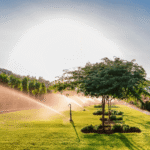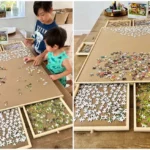Table of Contents
- Outdoor Games That Bring Everyone Together
- Nature Exploration for All Ages
- Easy Camping Crafts and DIY Fun
- Water Activities to Beat the Heat
- Making Memories Around the Campfire
- Rainy Day Ideas That Kids Will Love
- Safety, Preparation, and Outdoor Etiquette
Key Takeaways
- Discover creative ideas to keep everyone engaged during your next camping adventure.
- Uncover ways to enjoy the outdoors as a family, regardless of experience level.
- Helpful access to resources and safety tips to make your trip both enjoyable and secure.
Outdoor Games That Bring Everyone Together
The foundation of an unforgettable family camping trip is play. When families venture outdoors, laughter and friendly competition set the stage for making connections and building lifelong memories. Classic games like capture the Flag remain favorites, but even something as simple as “Simon Says” takes on new excitement under the trees. When organizing a camping getaway, it’s worth picking a location that encourages these kinds of group activities. Many parks offering RV camping Massachusetts provide sprawling open areas, ideal for games that involve plenty of movement and space.
Scavenger hunts are a crowd-pleaser and can be easily tailored for any age group. Try listing items that reflect the unique ecosystem of the campsite, from a pinecone to a feather. Additionally, if you’re camping with teens, consider introducing a photo scavenger hunt using phones or instant cameras. Relay races, three-legged competitions, or even a family game of frisbee ensure everyone gets moving. Encourage older family members to lead a game or invent new rules—kids love it when grown-ups get just as silly and involved!
Nature Exploration for All Ages
Exploration is the heart of camping for many families. Each walk, whether a mile-long hike or a short amble from the tent to the lake, is an opportunity to discover something new. Bringing along field guides, magnifying glasses, or binoculars can transform an ordinary outing into a journey of discovery. When visiting new parks or forests, seek out interpretive trails or junior ranger programs that help everyone—especially younger campers—learn about local wildlife and plant species.
Nature journaling is another accessible option. Children can document their finds through drawings, leaf rubbings, or written notes. Not every discovery needs to be major; watching an ant hill or following a line of moss up a tree can fill hours with wonder. Integration of guided walks, often led by knowledgeable rangers or volunteers, can open the door to understanding complex ecosystems as families learn to spot birds, track animal prints, or recognize edible berries and plants (but only with expert confirmation!). For older kids and adults, geocaching is a high-tech take on treasure hunting that introduces map reading and navigation skills—all while keeping the spirit of adventure alive.
Easy Camping Crafts and DIY Fun
Downtime at the campsite is a perfect opportunity for creativity to shine. Rather than reaching for screens, gather materials from around the campsite—fallen leaves, twigs, smooth stones—and start making. Rock painting is a perennial favorite. Kids enjoy turning basic stones into bugs, animals, or abstract designs, and painted rocks can double as trail markers or tokens to hide for others to find. Friendship bracelets woven from grass, yarn, or twine offer another way to pass the time, and their simplicity means even the youngest campers can contribute.
Leaf rubbing, where children place leaves under paper and gently rub crayons on top, always delights, especially if they try layering different shapes and colors. Even making nature mobiles—tying pinecones, shells, and feathers to a stick with string or rubber bands—can become a favorite quiet-time activity. Some families also keep a camp journal, encouraging each person to add drawings, observations, and “top moments” from each day. These keepsakes often become treasured souvenirs, reigniting the spirit of adventure once everyone returns home.
Water Activities to Beat the Heat
On a hot summer afternoon, the lure of water proves irresistible for campers of all ages. Whether near a lake, pond, or stream, swimming is a classic camping pastime. For extra adventure, many campgrounds rent canoes, kayaks, or paddleboards—fun for older children and teens looking for a new challenge. If your group prefers to keep things simple, activities like wading, skipping stones, or collecting pretty pebbles can be just as satisfying.
For families with young children, supervised splash zones or shallow edges offer a perfect introduction to water play. Always pack extra towels, swim shoes, and sun protection, and constantly monitor children within arm’s reach in and around water. Seasoned campers know that comprehensive water safety is key: review the basics, such as never swimming alone, always wearing a life jacket, and knowing which areas have lifeguard supervision. The freedom and joy of water activities will quickly become one of the most anticipated parts of any camping itinerary.
Making Memories Around the Campfire
As twilight falls, campers naturally gather around the glow of the fire. What happens here can shape the mood and memories of the entire trip. Storytelling is timeless; everyone, no matter their age, enjoys the suspense of a good ghost story or the silliness of family anecdotes. S’mores—gooey marshmallows toasted to perfection—are a must but consider expanding the snack menu to include campfire cones, bananas stuffed with chocolate, or savory grilled snacks.
Group activities are plentiful. Try sing-alongs, instrumental jams, or even lighthearted talent shows where each person performs for the group. Stargazing, too, offers a magical finish as constellations slowly become visible overhead. Many families adopt a nightly ritual—whether making a wish on the first star or going around the circle sharing what they enjoyed most about the day.
Rainy Day Ideas That Kids Will Love
A change in the weather needn’t ruin your trip; with a bit of preparation, rainy days can become some of the most creative and cherished times. Pack a special “rainy day bag” with compact board games, playing cards, coloring books, and storytelling dice. Tents and RVs make cozy spaces for group games or story circles. Invent your games, such as “guess the wildlife sound” using recorded calls, or hold a tent-side shadow puppet contest with flashlights.
For those who like to stay active, learn a few basic bushcraft skills like knot tying or identifying safe wild edibles while waiting for the sun to return. Reading aloud from adventure stories or nature books helps keep spirits high. Use the rain as a teaching moment; children quickly learn to adapt, stay positive, and even celebrate the change of pace. Spending time outdoors, even in less-than-perfect weather, can offer a range of physical and mental health benefits, as highlighted by Healthline. Nothing beats the sound of rain on a tent roof when you’re gathered together, warm and dry, making the most of your time in nature. These quiet moments often become the most memorable parts of the trip. They remind us that connection—with each other and with the natural world—is what outdoor adventures are truly about.
Safety, Preparation, and Outdoor Etiquette
Responsible camping means being comfortable, confident, and considerate of both nature and fellow campers. Begin by discussing the basic “Leave No Trace” principles with the entire group, focusing on staying on designated trails, disposing of waste properly, and respecting wildlife. These principles, as highlighted in a USA Today article, serve as a foundational guide for preserving the natural beauty and health of our national parks. Encourage children to take an active role by having them double-check the site for litter or lead clean-up efforts after meals. Preparation is more than remembering the marshmallows; bring a stocked first aid kit, extra food and water, and a paper map in case of electronics failure. Review emergency procedures together, designate a meeting spot in case someone wanders off, and assign specific tasks, such as monitoring the weather or overseeing fire safety. If pets are joining, ensure their vaccinations are up to date and pack their comfort items, food, and leashes. Research the campground’s rules on pets, fires, and quiet hours to avoid surprises. By modeling positive outdoor behavior, parents lay the foundation for future generations of responsible adventurers.
Read More : Personalized Hair Removal: Science-Backed Strategies for Lasting Results





